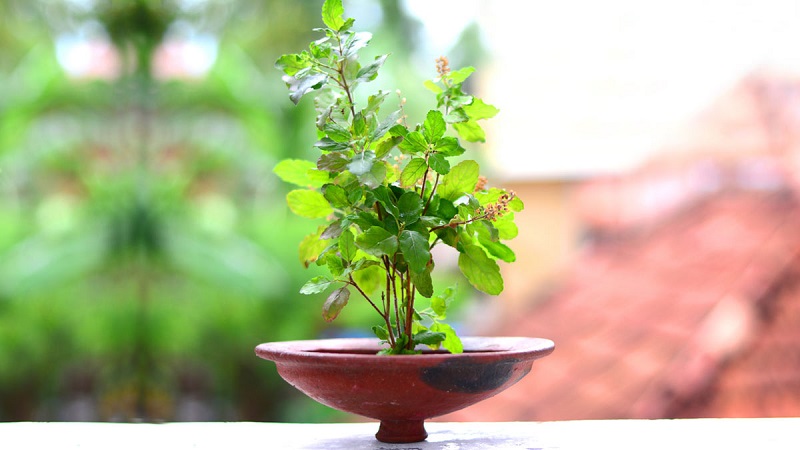In the realm of holistic well-being, the Tulsi plant, also known as Holy Basil, has emerged as a powerhouse of health benefits. Beyond its religious and cultural significance, Tulsi boasts a myriad of advantages that make it a valuable addition to any home. In this article, we explore the top 10 benefits of having a Tulsi plant in your home, accompanied by frequently asked questions to guide you on your journey to a healthier, happier lifestyle.
10 Amazing Tulsi Plant Benefits for Home with Vastu Placement Tips:
Discover the numerous benefits of having a Tulsi plant in your home! From boosting immunity to purifying the air, Tulsi’s medicinal and spiritual significance makes it a valuable addition. Explore how this sacred plant enhances well-being and creates a positive atmosphere in your living space.”
1. Boosts Immunity:
Tulsi is renowned for its immunomodulatory properties, enhancing the body’s ability to fight infections and diseases. Regular consumption of Tulsi leaves or tea made from them can contribute to a stronger immune system.
2. Purifies Air:
The Tulsi plant acts as a natural air purifier by absorbing harmful pollutants and releasing oxygen. Placing a Tulsi plant in your home can significantly improve indoor air quality, providing you with fresh and clean air.
3. Stress Relief:
The adaptogenic properties of Tulsi help the body adapt to stress and promote mental well-being. A potted Tulsi plant in your living space can act as a natural stress reliever, promoting relaxation and calmness.
4. Antioxidant-Rich:
Loaded with antioxidants, Tulsi helps combat oxidative stress and neutralize free radicals in the body. Including Tulsi in your diet or skincare routine can contribute to a youthful and radiant appearance.
5. Respiratory Health:
Tulsi possesses anti-inflammatory and anti-microbial properties that support respiratory health. Inhaling the aroma of Tulsi leaves or consuming Tulsi tea may help alleviate respiratory issues like cough and cold.
6. Balances Blood Sugar Levels:
Studies suggest that Tulsi may help regulate blood sugar levels, making it beneficial for individuals with diabetes. Including Tulsi in your diet can be a natural way to support overall metabolic health.
7. Aids Digestion:
The essential oils present in Tulsi have digestive properties that can help alleviate indigestion and bloating. Consuming Tulsi leaves or tea after meals may promote a healthy digestive system.
8. Anti-Inflammatory Properties:
Tulsi is known for its anti-inflammatory properties, which can be beneficial for conditions like arthritis and inflammatory bowel diseases. Including Tulsi in your daily routine may help manage inflammation.
9. Natural Insect Repellent:
The strong aroma of Tulsi acts as a natural deterrent for insects and mosquitoes. Placing a Tulsi plant near windows or outdoor seating areas can help keep unwanted bugs at bay.
10. Promotes Oral Health:
Tulsi’s antimicrobial properties make it effective in promoting oral health. Chewing Tulsi leaves or using Tulsi-infused toothpaste may help prevent oral infections and maintain good dental hygiene.
Tulsi Plant Vastu Tips For Home:
Tulsi, or Holy Basil, is not only valued for its medicinal properties and religious significance but also holds importance in Vastu Shastra, the traditional Indian system of architecture. Here are some Vastu tips for placing and nurturing a Tulsi plant in your home:
- Location in the Northeast: Ideally, place the Tulsi plant in the northeast corner of your home. This direction is considered highly auspicious in Vastu, believed to enhance positive energy flow and spiritual vibrations.
- Avoid South or Southwest: It is recommended to avoid placing Tulsi in the south or southwest directions, as these areas are associated with negative energies. Placing the plant here may disrupt the balance of positive forces within your home.
- Indoor Placement: If outdoor placement is not feasible, you can keep a Tulsi plant indoors near a window in the northeast or eastern part of the house. Ensure it receives ample sunlight for healthy growth.
- Tulsi Vrindavan at Home: Designate a specific area for Tulsi worship, commonly known as Tulsi Vrindavan. This sacred spot can be adorned with clean, decorative elements and should ideally be in the northeast or east part of the house.
- Avoid Bedroom Placement: Refrain from placing Tulsi in the bedroom. Bedrooms are considered places of relaxation, and the vibrant energy of Tulsi may not align with the calm ambience needed in this space.
- Well-Maintained Surroundings: Keep the Tulsi plant and its surroundings clean and well-maintained. Remove dried leaves regularly and ensure that the soil is fertile. A healthy and thriving Tulsi plant is believed to attract positive energy.
- Offer Daily Worship: Engage in daily worship rituals around the Tulsi plant. This not only aligns with religious practices but also contributes to the positive energy circulating within your home.
- Lighting Around Tulsi: Adequate lighting around the Tulsi plant, especially in the evening, is considered auspicious. It is believed to attract positive energy and ward off negativity.
- Watering Practices: Follow a consistent and mindful watering schedule for the Tulsi plant. Overwatering or underwatering should be avoided, as it may affect the overall well-being of the plant and its energy contribution.
- Harvesting Leaves During the Day: According to Vastu principles, it is preferable to pluck Tulsi leaves during the day rather than at night. Harvesting leaves during daylight hours is believed to be more auspicious and aligns with positive energy principles.
By incorporating these Vastu tips, you can create a harmonious and positive energy flow within your home through the presence of the sacred Tulsi plant.
Incorporating a Tulsi plant into your home can be a transformative step towards a healthier and more harmonious lifestyle. From immune-boosting properties to stress relief and beyond, the benefits of Tulsi are vast and varied. By addressing common questions, we hope to guide you in harnessing the incredible potential of this sacred plant for the well-being of you and your loved ones.
FAQs:
Q1. How often should I water my Tulsi plant?
A1: Tulsi plants prefer well-drained soil and should be watered when the topsoil feels dry to the touch. Avoid overwatering, as Tulsi does not thrive in waterlogged conditions.
Q2. Can I grow Tulsi indoors?
A2: Yes, Tulsi can be grown indoors in pots or containers. Ensure that it receives sufficient sunlight and is protected from drafts.
Q3. Is it safe to consume Tulsi daily?
A3: Yes, consuming Tulsi in moderate amounts is generally safe for most people. However, it’s advisable to consult with a healthcare professional, especially if you are pregnant, nursing, or taking medications.
Q4. How can I use Tulsi for skincare?
A4: You can incorporate Tulsi into your skincare routine by using Tulsi-infused face masks, and creams, or by simply applying Tulsi essential oil diluted in a carrier oil.
Akshata Singh
Akshata Singh is a senior content writer with experience of 6 years. She has been writing articles for lifestyle blogs, i.e., Health, Beauty, Fashion, Interior, Products & many more. To know more about her works, do check out the below profiles.





